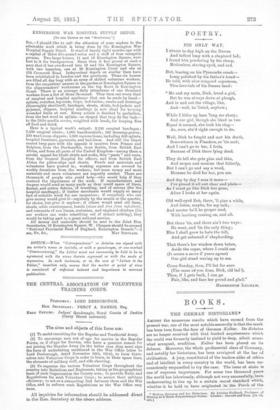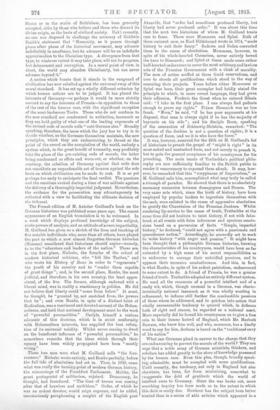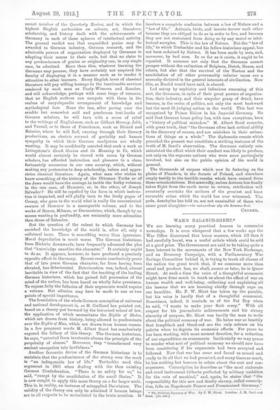BOOKS.
THE GERMAN HISTORIANS.*
AMIDST the numerous results which have ensued from the present war, one of the most notable assuredly is that the mask has been torn from the face of German Kultur. Its dictates are no longer received with that hushed acquiescence which the world was formerly inclined to yield to deep, albeit sonic- what arrogant, erudition. Kultur has been placed on its defence. Moreover, the whole professorial class of Germany, and notably her historians, has been arraigned at the bar of civilization. A jury, constituted of the leaders alike of ethics and of intellect in every country in the world, has been un- consciously empanelled to try the case. The issue at stake is one of supreme importance. For some two thousand years the world has laboriously, although not very successfully, been endeavouring to live up to a certain moral standard which, whether it be held to have originated in the Porch of the • Modern Germany and her Ili.storinns. 137 Antoine Ouilland, Proreseor ur HIstory at L'Ecole rolitechnique &Ono. London s Jarrell:land Sous. E7s.
net.1
Stoics or in the stable of Bethlehem, bas been generally accepted, alike by those who believe and those who discard, its divine origin, as the basis of civilized society. Until recently, no one was disposed to challenge the accuracy of Goldwin Smith's statement that "Humanity, as it passes through phase after phase of the historical movement, may advance indefinitely in excellence, but its advance will be an indefinite approximation to the Christian type. A divergence from that type, to whatever extent it may take place, will not be progress, but debasement and corruption. In a moral point of view, in short, the world may abandon Christianity, but can never advance beyond it."
A nation which boasts that it stands in the vanguard of civilization has now rebelled against the universal sway of this moral standard. It has set up a wholly different criterion by which human actions are to be judged. It has placed the interests of Germany—or perhaps it would be more strictly correct to say the interests of Prussia—in opposition to those of the rest of the human race, with the significant exception of the semi-barbarous Turks. Those who do not conform to the new standard are condemned to extinction, inasmuch as they are held guilty of what one of the leading exponents of the revised code of morals calls "anti-German sins," Broadly speaking, therefore, the issue which the jury has to try is to decide whether, as the Germans themselves maintain, the new principles, which they are endeavouring to thrust at the point of the sword on the acceptation of the world, embody a system which, to the great benefit of humanity, may profitably take the place of the pre-existing code of morals, the latter being condemned as effete and worn-out, or whether, on the contrary, the rebellion of Germany against that code does not constitute an unpardonable act of treason against the sole basis on which civilization can be made to rest. It is as yet perhaps too early to anticipate the final verdict. The passions and the emotions evoked during a time of war militate against the delivery of a thoroughly impartial judgment. Nevertheless, the evidence for the prosecution may advantageously be collected with a view to facilitating the ultimate decision of the tribunal.
Tile French edition of M. Antoine Guilland's book on the German historians was published some years ago. The recent appearance of an English translation is to be welcomed. I a work which displays profound knowledge of the subject, acute powers of analysis, and an attitude of severe impartiality, M. Guinea has given us a sketch of the lives and teaching of five notable individuals who, more than all others, have played the part to which a now almost forgotten German historian (Ilitueser) considered that historians should aspire—namely, to be the "educators and leaders of the nation." These are, in the first place, Niebuhr, the founder of the school of modern historical criticism, who "felt like Tacitus," and who wrote his History of Rome in order to "regenerate" the youth of his country and to "render them capable of great things "; and, in the second place, Ranke, the most judicial, and therefore, in his own country, the least appre- ciated, of the five. The former, although endowed with a liberal mind, was in reality a reactionary in politics. He did not believe that liberty could "come from below." It must, he thought, be "granted by, not snatched from, the powers that be " ; and even Henke, in spite of a distinct taint of Radicalism, was a convinced and devoted servant of the Hohen- zollerns, and held that national development must be the work of "powerful personalities." Carlyle,. himself a zealous advocate of this doctrine, which is in strict conformity with Hohenzollern interests, has supplies the best refuta- tion of its universal validity. Whilst never ceasing to dwell on the beneficent influence of "powerful personalities," he somewhere remarks that the ideas which through their agency have been widely propagated have been "mostly wrong."
These two men were what M. Guilland calls "the fore- runners." Niebuhr wrote entirely, and Ranks partially, before the full tide of absolutism had set in. Then, in 1849, came what was really the turning-point of modern German history, the miscarriage of the Frankfort Parliament. Moltke, the great protagonist of militarism, rejoiced. Democracy, he thought, had foundered. "The time of heroes was coming after that of brawlers and scribblers." Order, of which he was an ardent devotee, would reign Supreme, and he added, unconsciously paraphrasing a couplet of the English poet Akenside, that "order bad sometimes produced liberty, but liberty had never produced order." It was about this time that the next two historians of whom M. Guilland treats rose to fame. Those were Mommeen and Sybel. Both of these eminent men, as Karl Hildebrand wrote in 1874, "made history to suit their fancy." Sadowa and Sedan converted them to the cause of absolutism. Mommsen, however, in spite of his whole-hearted Cacsarism, never entirely bowed the knee to Bismarck ; and Sybel at times made some rather half-hearted endeavours to cover the most arbitrary, andlawlees acts of the Prussian Government with a cloak of morality.
The men of action scoffed at these timid reservations, and tore to shreds all qualifications which stood in the way of
executing their projects. Years before either Mommsen or Sybel was born, their great exemplar had boldly stated the principle to which, in more covert language, they had given their adhesion. Frederie the Great when lie entered Silesia said : "I take in the first place. I can always find pedants enough to prove my rights," Prince Bismarck was no less frank. "Even," he said, "if he has poor arguments at his disposal, that man is always right if he has the majority of bayonets on his side "; and his disciple Roon, speaking of the annexation of Schleswig-Holstein, remarked: "The question of the duchies is not a question of rights ; it is a question of force, and we it is who have the force."
It was, however, reserved for the fifth on K Guilland's list of historians to preach the gospel of "might is right" in its most naked and unabashed form, and not merely to preach it, but to gain the general acceptance of his countrymen for his preaching. The main tenets of Treitschke'e political philo- sophy are now sufficiently familiar to the British public to render it unnecessary to expound them afresh. It may, how- ever, be remarked that this " corypbaens , of Imperialism," as M. Guilland calls him, accomplished what may truly be called a triumph of paradox. He showed that there is no absolutely necessary connexion between demagogues , and Demos. The very same arts which, since the birth of history, have been employed by popular leaders to ingratiate themselves with the mob, were enlisted in the cause of aggressive absolutism to gratify the Chauvinism of the Prussian Junkers. Whilst rendering lip-service to the cause of truth, Treitschke at the same time did not hesitate to taint history, if not with false- hood, at all events with false inferences and specious conclu- sions based on a perversion of facts. "Simple, impartial history," he declared, "could not agree with a passionate and quarrelsome nation." Accordingly, he avowedly set to work to write history "with anger and passion." It might have been thought that a philosophic German historian, knowing the characteristics of his countrymen, would have been so fat animated by a high sense of his moral responsibilities as to endeavour to assuage their unbridled passions, and to appease their excessive combativeness. And this, in fact, is what Ranke, in spite of his ardent patriotism, endeavoured to some extent to do. A friend of Prussia, he was a greater friend of truth. Treitschke adopted an entirely different system. He used all the resources of a powerful intellect and of a ready wit, which, though unusual in a German, was charac- teristically national inasmuch as it was wholly wanting in refinement, to inflame still further the combustible passions of those whom he addressed, and to quicken into action that wholly unreasonable tendency to quarrel which, in defiance both of right and ,reason, he regarded as a national asset. More especially did he hound his countrymen on to give a free rein to their insane hatred of England, which Mr. Harbutt Dawson, who knew him well, and who, moreover, has a kindly word to say for him, declares is based on the "traditional envy of his nation."
What can Germans plead in answer to the charge that they are endeavouring to pervert the morals of the world ? They can urge that a noble army of German scientists, thinkers, and scholars has added greatly to the store of knowledge possessed by the human race. Even this plea, though, broadly speaks lug, admissible, must be accepted with some qualifications. Until recently, the tendency, not only in England but also elsewhere, has been, far from minimizing, somewhat to exaggerate the debt of gratitude which the world of intellect owes to Germany. Since the war broke out, more searching inquiry has been made as to the extent to which this debt is really due. Nowhere has the subject been better treated than in a series of able articles which appeared in a
recent number of the Quarterly Review, and in which the highest English authorities on science, art, literature, scholarship, and history dealt with the achievements of Germany in each of these spheres of intellectual activity. The general verdict was that unqualified praise may be awarded to German industry, German research, and the admirable powers of organization displayed by Germans in adapting their means to their ends, but that no claim to any predominance of genius or originality can, in any single ease, be admitted. More than this, whatever learning the Germans may possess, they have certainly not acquired the faculty of displaying it in a manner such as to render it attractive to other learners. Every English lover of classical literature will pay willing homage to the inestimable services rendered by such men as Pauly-Wiseowa and Reacher, and will acknowledge, perhaps with some tinge of remorse, that no English authors can compete with them in the realms of encyclopaedic arrangement of knowledge and mythological lore. None the less, after poring over the erudite but somewhat arid and ponderous text-hooks of German scholars, he will turn with a sense of relief to the writings of Englishmen, such as Gilbert Murray, Jobb, and Verrall, or to those of Frenchmen, such as Berard and Boissier, where he will find, running through their literary productions, an electric current of geniality and human sympathy in which their German coadjutors are wholly wanting. It may be confidently asserted that such a work as Livingstone'a Greek Genius and its Meaning to Us, which would almost certainly be viewed with scorn by German scholars, has afforded instruction and pleasure to a class, fortunately numerous in our own conntry, which, without making any pretension to deep scholarship, values and appre- ciates classical literature. Again, what man who wishes to know something of the history of the Ottoman Turks or of the Jews would have the courage to tackle the bulky volumes, in the one case, of Hammer, or, in the other, of Joseph Salvador ? He will be repelled by the form in which instruc- tion is imparted, and will gladly turn to the lively pages of Creasy, who gave to the world what is really the concentrated essence of Hammer in a manageable volume, and to the works of Ronan, Milman, or Darmesteter, which, though by no means wanting in profundity, are eminently more attractive than those of Salvador.
But the question of the extent to which Germany has enriched the knowledge of the world is, after all, only a collateral issue. There is something worse than ignorance. Moral degradation is much worse. The German historians, from Niehnhe downwards, have frequently advanced the plea that "knowledge ennobles the character." It certainly ought to do so. It appears, however, to have produced a precisely opposite effect in Germany. Recent events conclusively prove that of late years German character, far from having been elevated, has deteriorated. Deterioration was, indeed, almost inevitable in view of the fact that the teaching of the leading German historians, which has gained full possession of the mind of the nation, has been based on wholly false premieses. To expose fully the fallacies of their arguments would require a volume. But allusion may here be made to one or two points of special importance.
The foundation of the whole German conception of universal and national development is, as M. Guilland has pointed out, based on a theory put forward by the historical school of law, the application of which necessitates the Rights of Stales, which are drawn from history, being allowed to predominate over the Rights of Man, which are drawn from human reason. In a few pregnant words M. Albert Sorel has conclusively exposed the fallacy of this theory. The German historians, he says, "extorted from inveterate abuses the principle of the perpetuity of abuses." Moreover, they "transformed very ancient usurpation into lawfulness."
Another favourite device of the German historians is to maintain that the peedominance of the strong over the weak is "an indisputable law of life." Treitschke used this argument in 1861 when dealing with the then existing German Confederation. "There is no safety for us," be mid, "except by the annihilation of the small States." It is now sought to aieply this same theory on a far larger scale. This is, in reality, an instance of misapplied Darwinism. The -validity of the theory can only be admitted if human beings are in all respects to be assimilateil to the brute ereatiou. 11
involves a complete confusion between a. law of Nature and a "law of life." Animals, birds, and insects devour each other because they are obliged to do so in order to live, and because they are not restrained from doing so by any moral or intel- lectual scruples. This is the law of Nature. But the "law of life," to which Treiteclike and his fellow-historians appeal, has not been ordained by Nature. It has been made by men, and, moreover, by bad men. In so far as it exists, it ought to be repealed. It assumes not only that the Germane cannot prosper without the extinction of Belgians, Dutch, Danes, and others, but also that the survival of the Teuton and the annihilation of all other presumably inferior races are a necessity dictated in the general interests of civilization. Now this, as Euclid would have said, is absurd.
Led astray by sophistry and fallacious reasoning of this sort, the Germans, in spite of their great powers of organize- tionetheir industry, and their singular grasp of detail, have become, in the realm of politics, not only the most backward but the most ill-judging nation in the world. This fact was recognized by Prince Billow in his Imperial Germany. He said that German home policy has, with rare exceptions, been a "history of political mistakes." M. Albert Sorel remarks, with great truth, that "time Germans often lack critical ability in the discovery of causes, and are mistakeu in their estima- tions of things as a whole." , The diplomatic events which preceded the present war constitute a striking instance of the truth of M. Sorel's observation. The Germans entirely mis- calculated the effect which their conduct was likely to produce, not only on the separate nations who were more particularly involved, but also on the public opinion of the world in general.
The thousands of corpses which now tie festering on the plains of Flanders, in the forests of Poland, and elsewhere amply testify to the terrible results which have ensued from these miscalculations. But assuredly, unless Astraem has finally taken flight from the earth never to return, retribution will eventually overtake the authors of the greatest and least excusable crime which the world has ever witnessed. The gods, Aeschylus has told as, are not unmindful of those who cause great slaughter—re
RO—VICT-Y0.40 'yap 06/C doomenrot CROMER.




































 Previous page
Previous page